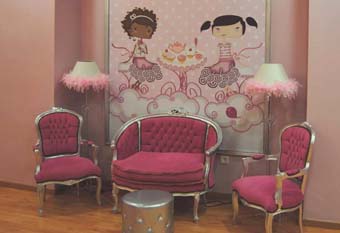
Sara Vierna Fernández, a social educator and Master’s Degree in Gender and Equality Politics of the UV has just presented the research “New Dresser Princesses” (Neo-princesas de probador). A work which analyses the consequences for the equality between men and women, with the proliferation of children’s leisure companies addressed to 4 to 12 year old girls who recreate a world of fantasy immersed in luxury and glamour, accompanied by beauty care services simulating a children beauty salon.
On this report, Vierna Fernández warns of the importance of games as one of the learning resources of the gender during the childhood. According to the author <in these places, instructors (mainly women), through games, turn little girls into princesses or models; instructors also make them up, comb their hair, or even paint the girls’ nails. A beauty ritual is recreated, and girls get a clear message: physic appearance is so important that such a special day like your birthday should be dedicated to it.
This message, though it is not intentioned, leaves a profound mark in the future self-esteem during the teenage years and during adulthood, and it might accentuate several psychological disorders>.
This research aims to investigate theoretically about the function of leisure activity in the cognitive and social development of childhood. What happens is that children learn to think and to think themselves, to build and build themselves, to locate and locate themselves in society, to perceive and to perceive themselves and to develop language through games.
In this sense, this research sets the narrow relationship between play of roles and the lack of a gender identity determined during childhood. Symbolic games play a key role and despite not being the sole cause, it is indeed a process with potentiates the acquirement of this pattern of behaviour which subordinates the women’s world to the men’s world. So, women are given the qualities of beauty, emotions, care, indifference, placing them in a domestic space; while men are attached the qualities of aggressively, competitiveness, power, courage and action, placing them in the public space.
Cult of girls’ beauty
The cult of girls’ beauty is another factor which manifests in the feminized game. This element is the central point of this research which is focused on Princelancia (a children’s leisure company) which concludes the predominant submission in the mothers’ speeches on the sexualized view of the playful phenomena. According to Vierna Fernández, “all mothers without exception consider psychosocial development of their daughters as positive, the traditionally feminine values which inculcates the company Princelandia through sexualized game”. A game produces and reproduces sexist.
In the second place, in relation with the mystic of beauty, mothers and the company conceive the care of the personal image as a feminine empowerment element inherent to the traditional gender identity of girls and women. Thus, they manifest the positivity of the princess’ games in the psychosocial development of their daughters, understanding it as a factor which exalts their traditional femininity mainly related with the cult to the feminine body. That is why the kind of activities which are carried out in these places are focused on the body and beauty where the instructors cover the girls with treatments in order to be valued by their mothers.
As the author points out, this time of leisure activity promotes a sexualized game , the recreation of a princely game, full of glamour luxury and beauty which drive girls to the bondage to stick to a impossible and unhuman model which may make people sick, making them vulnerable towards eating disorders and other types of psychopathology.
Last update: 29 de may de 2014 10:30.
News release



















